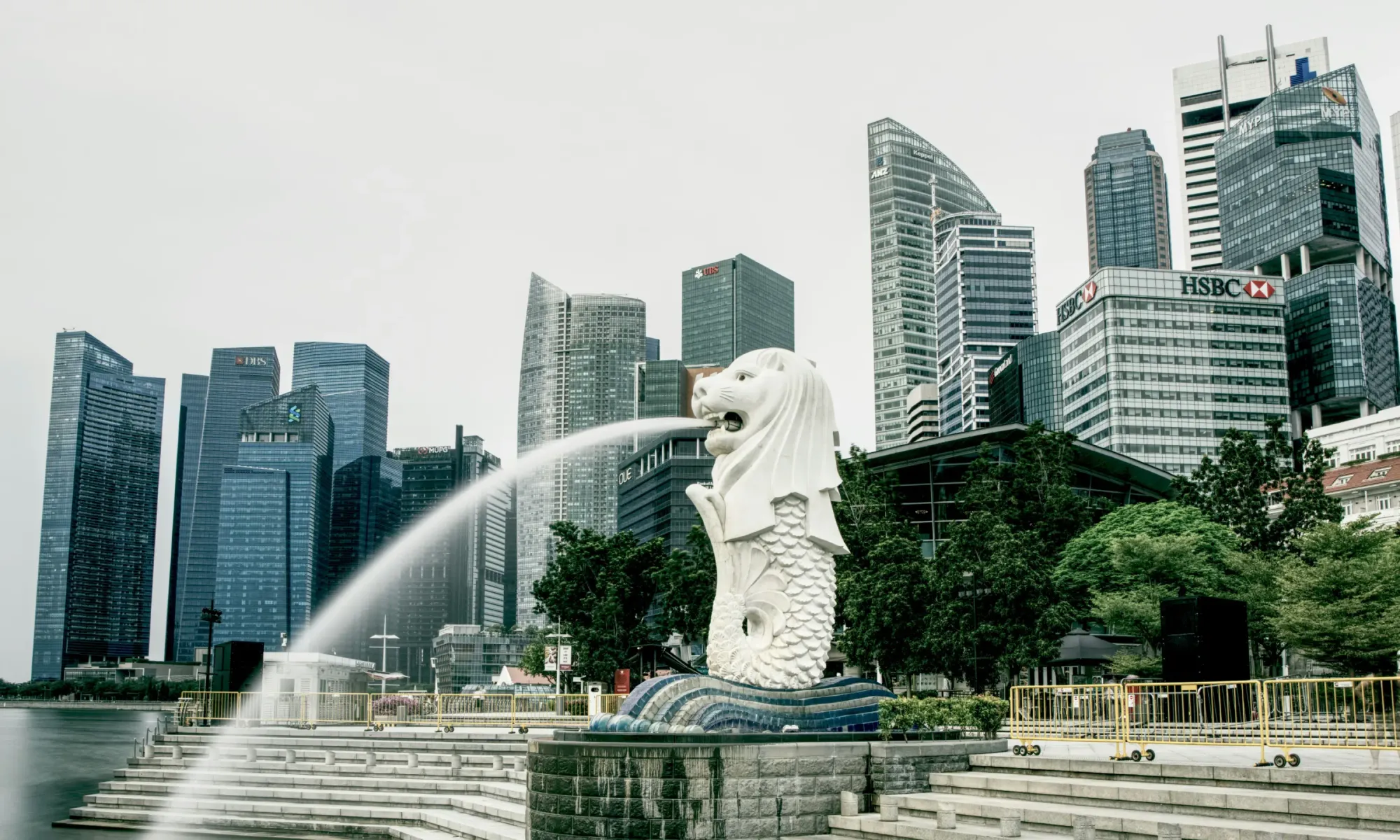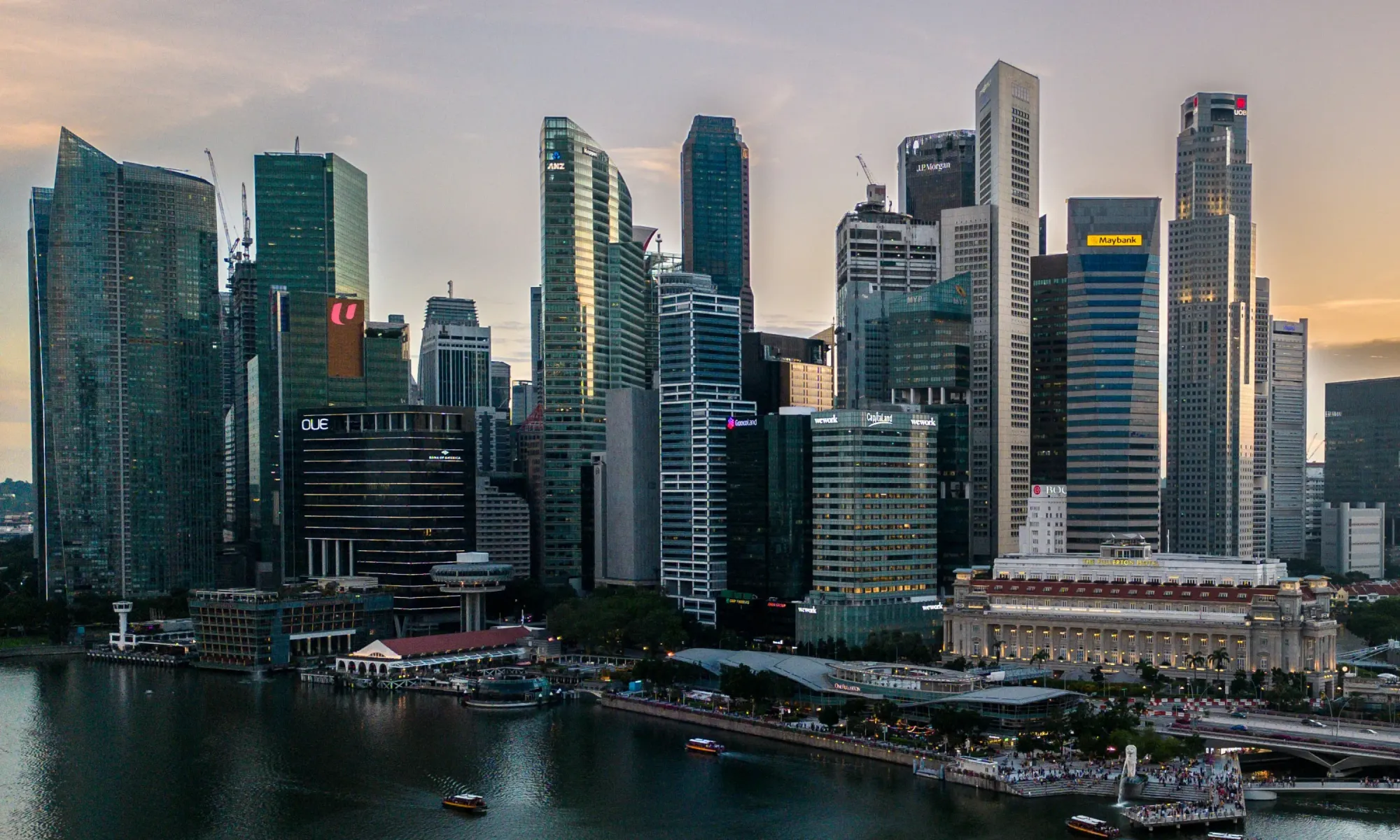Tokenization in Singapore: Opening Real Estate to the Digital Future
In this overview, we’ll see how tokenization is developing in Singapore – why it’s happening, what the rules are, who the major players are, and what challenges remain on the path ahead.

Singapore’s real estate market is known for sky-high property prices and a strong finance sector. It’s no surprise that the country is exploring real estate tokenization – turning property value into digital tokens on a blockchain so people can invest with smaller amounts of money. In simple terms, tokenization means a building or fund is divided into many small shares, which are sold as digital tokens. Investors can buy a fraction of a property instead of the whole asset. This concept is gaining traction in Singapore, where authorities and companies are cautiously embracing innovation to make property investment more accessible while keeping strict regulatory oversight. In this overview, we’ll see how tokenization is developing in Singapore – why it’s happening, what the rules are, who the major players are, and what challenges remain on the path ahead.
Table of Contents
- Why Tokenize Real Estate in Singapore?
- Clear Regulations and Supportive Regulators
- Platforms and Pioneering Projects
- Challenges and the Road Ahead
Why Tokenize Real Estate in Singapore?
Singapore consistently ranks as one of the world’s most expensive property markets. Buying even a small apartment or office can cost millions of dollars, putting direct real estate ownership out of reach for most individuals. Tokenization offers a way to lower these barriers. By converting a property into, say, 1,000 digital tokens, the cost to invest can drop from millions to just thousands of dollars per token. This fractional ownership model means more people can participate in high-value real estate deals that were once limited to the wealthy or big institutions. As experts note, tokenization can “lower the entry barrier by reducing the capital outlay” needed for real estate, while also giving investors access to vetted opportunities that might be hard to find otherwise. It can remove the burden of active property management for investors (since a professional handles the asset) and even provide enhanced liquidity – the ability to trade out of the investment more easily than a traditional property holding. In short, breaking assets into digital shares lets people buy “small slices” of buildings instead of whole units, making real estate investment more flexible and inclusive.

Another motivation is to attract global capital and broaden the investor pool. Singapore is a financial hub that already draws international investors, and tokenization could amplify this. By issuing digital tokens that can be bought from anywhere, a Singapore property deal could more easily involve investors from Europe, the U.S., or neighboring Asian countries. Traditionally, investing in Singapore real estate from overseas might require navigating local laws, paying for legal advisors, and handling complex paperwork. With tokens, much of that can be handled on a blockchain platform, potentially streamlining cross-border investments. For example, an overseas investor could simply register on a Singapore tokenization platform, pass the necessary checks, and buy tokens representing a stake in a building – without flying to Singapore or dealing with local land offices. This promise of seamless international access is a big reason many see Singapore as a natural base for tokenized real estate projects.
Local developers and fund managers also view tokenization as a way to expand their funding options. Instead of relying solely on banks or issuing large bonds, a developer can raise money by selling tokens to a mix of individual investors and smaller funds. This democratizes the fundraising process. A recent seminar in Singapore highlighted that high-net-worth individuals showed strong appetite for such instruments as a way to spread risk across multiple properties. By buying tokens in different projects, an investor can diversify their real estate portfolio (geographically or by sector) much more easily than if they had to buy entire properties. For developers, tapping a wider base of investors via tokens could become an alternative to traditional loans or Real Estate Investment Trusts (REITs). It’s essentially a new financing tool that, when done in compliance with regulations, can complement Singapore’s sophisticated real estate investment market.

Finally, tokenization aligns well with Singapore’s identity as a tech-savvy nation. The government has a vision for “Smart Nation” initiatives and has been supportive of fintech and digital innovation. Applying blockchain to real estate is in line with these goals, potentially increasing efficiency and transparency. Property transactions in Singapore can be slow (though the country is quite efficient compared to many others) and involve considerable paperwork. If successful, tokenization could one day mean parts of the process – from recording ownership to distributing rental income – happen automatically via smart contracts. This could reduce administrative costs and errors. While such full integration (like linking tokens directly to the land registry) is still a work in progress, exploring tokenization now ensures Singapore stays at the forefront of financial innovation, which is a point of pride and strategic advantage for the country.
Clear Regulations and Supportive Regulators
One reason real estate tokenization is picking up momentum in Singapore is the clear legal framework being applied. The Monetary Authority of Singapore (MAS – the country’s central bank and financial regulator) has made it plain that tokenized real estate falls under existing securities laws. In fact, MAS has clarified that any token representing ownership or economic interest in a property is considered a capital markets product, just like a stock or bond. This means companies cannot simply sell property tokens freely; they must comply with the Securities and Futures Act and related regulations. In practice, a token offering in Singapore must either be registered or qualify for an exemption, and the platforms dealing with such tokens must be licensed. The upside of this approach is that it gives legal certainty – “same activity, same risk, same rules”. Investors know that tokenized assets have to follow the strict disclosure and compliance standards of the financial sector, which can boost confidence and credibility.

Singapore’s regulators aren’t just setting rules – they’re actively encouraging innovation within those rules. MAS launched Project Guardian in 2022 as a sandbox program to experiment with asset tokenization in a controlled environment. Over 24 financial institutions, including major banks, participated in trials of tokenized bonds, deposits, and funds under MAS oversight. These sandbox trials have gone well enough that in late 2024, MAS unveiled plans to move from experimentation to commercialization. The regulator announced it will form industry networks and technical frameworks to enable tokenized assets (not just real estate, but also other securities) to be traded at scale. In other words, MAS is helping lay the plumbing for a future where tokenized assets can flow through the financial system. This includes working on common settlement facilities – for example, exploring the use of a digital Singapore dollar for settling token trades – and bringing big banks together to ensure there’s enough liquidity in these new markets. Such proactive steps by the regulator signal strong official support for tokenization as a concept.
| Component | Key Details |
|---|---|
| Regulator | Monetary Authority of Singapore (MAS) |
| Legal Basis | Securities and Futures Act (SFA) — tokenized property is treated as a capital markets product. |
| Required Licenses |
• CMS — for issuing or dealing in security tokens • RMO — for running secondary trading venues |
| Innovation Program | Project Guardian (launched 2022) — sandbox for tokenized funds, bonds, and deposits with 24+ institutions. |
| Compliance Focus | KYC / AML requirements, investor qualification (mostly accredited investors), and full disclosure obligations. |
Another supportive element is Singapore’s legal structures for investment funds, which have been updated for the digital age. A good example is the Variable Capital Company (VCC) framework – a flexible fund structure Singapore introduced in recent years. The VCC is already used for conventional investment funds, but Singapore has gone a step further with pilots like the Project e-VCC. In a proof-of-concept supported by MAS, InvestaX (a local tokenization platform) teamed up with financial giants UBS, State Street, and PwC to create a fully tokenized fund using the VCC structure. This eVCC project pioneered issuing tokenized shares in a fund and even enabled secondary trading of those fund tokens on a blockchain. The success of this pilot showed that Singapore’s legal entities can accommodate digital shares. It effectively proved that a fund in Singapore can maintain compliance (with proper oversight, audits, etc.) while its units are represented as blockchain tokens. The broader point is that Singapore’s ecosystem – from laws to corporate structures – is being adapted to support tokenization across various asset classes. Real estate stands to benefit from these developments, since a property tokenization deal could be structured via a VCC fund or trust that issues tokens to investors, all under well-defined rules.

Crucially, any firm doing a real estate token offering in Singapore must work with licensed intermediaries. MAS has several relevant license categories: for instance, a platform that issues or deals in security tokens needs a Capital Markets Services (CMS) license, and an exchange or marketplace for tokens needs a Recognized Market Operator (RMO) license. This is why platforms like InvestaX obtained multiple licenses – it is licensed by MAS as a CMS dealer in securities and also as an RMO for secondary trading. Similarly, other players have entered MAS’s licensing regime. The emphasis on licensed players means tokenization isn’t a wild west in Singapore; it’s handled by entities that meet fit-and-proper criteria, capital requirements, and compliance standards. MAS has even been running fintech sandbox express lanes to allow innovative firms to do limited trials while working toward full licenses. All tokens must also comply with strict KYC/AML (Know Your Customer and Anti-Money Laundering) rules, ensuring verified identities and clean sources of funds. By requiring “MAS-licensed CMS/RMO” involvement in token projects, Singapore effectively links the new world of blockchain with the established safeguards of finance. This approach might feel conservative to some crypto enthusiasts, but it lays a stable foundation for growth – and it’s already attracting major institutions to participate within a clear regulatory framework.
Platforms and Pioneering Projects
A handful of homegrown platforms and forward-looking companies are at the center of Singapore’s real estate tokenization movement. One notable player is Fraxtor, a Singapore-based real estate investment platform that uses blockchain to enable fractional ownership. Fraxtor is MAS-licensed and exemplifies the bridge between traditional real estate and digital finance. The company allows accredited investors (mostly wealthy individuals and family offices) to co-invest in property projects by buying tokens that represent shares in those ventures. Each investor on Fraxtor’s platform “owns tokens which represent an economic interest in the underlying asset,” as the CEO explains. Fraxtor made headlines in mid-2024 when it dual-listed a tokenized real estate fund on two exchanges – one in Singapore and one in Australia – at the same time. This cross-border token offering, which involved an Australian property trust, was fully subscribed within just two hours of launch. Such rapid sell-out demonstrated strong demand for the new format, with investors in both countries seizing the chance to buy in. It was the first known dual listing of a real estate token in Singapore and showed how a local platform could collaborate with overseas markets to broaden investor reach.

Fraxtor has also broken ground locally by partnering with major established developers. In late 2024, Fraxtor teamed up with CapitaLand Development, one of Asia’s largest real estate firms, to tokenize a stake in an industrial project in Singapore. The joint venture had acquired a plot of land at Kallang Way (through a government land tender) to develop a large food processing facility. Fraxtor’s role was to invite its community of investors to take up a fractional stake in this S$369 million project alongside CapitaLand. It was the first time individual investors could directly invest (via tokens) in a government land sale project in Singapore.
The response was enthusiastic – according to the company, the tokenized portion (with investment tickets ranging from S$25,000 up to S$5 million) was completely taken up in less than a day. This example is striking because it shows traditional real estate heavyweights and blockchain startups working hand in hand. CapitaLand gained access to a new pool of capital, while Fraxtor’s investors gained access to a prime development deal that would ordinarily be off-limits. Over the past five years, Fraxtor has tokenized around 25 projects with a total gross development value of S$2 billion, spanning Singapore, Australia, Japan and more. These include residential condos, industrial facilities, and even a piece of an automotive showroom in Bangkok. Such traction positions Fraxtor as a pioneer proving that tokenization can be applied to diverse real estate assets successfully.
Another key platform in Singapore is InvestaX, which focuses on a broad range of tokenized securities, including real estate and funds. InvestaX has been a trailblazer in working within Singapore’s regulatory framework to launch new products. As mentioned earlier, InvestaX co-led Project e-VCC, which created a fully tokenized investment fund structure for the first time. This project, done in collaboration with traditional finance firms, essentially showed how a fund investing in real estate (or other assets) could issue digital shares on-chain, with built-in compliance for transfers and trading.
InvestaX’s platform provides end-to-end services: issuance of tokens, custody solutions, investor onboarding (with KYC/AML checks), and a secondary trading venue – all under MAS licenses. This “one-stop” approach makes it easier for asset owners to consider tokenization, since a compliant infrastructure is readily available. For example, if a property developer or fund manager wants to tokenize an asset, they can partner with InvestaX to handle the tech and regulatory processes. InvestaX has also listed tokenized securities for trading among accredited investors, effectively operating like a digital private exchange. The presence of such platforms means Singapore has a mature ecosystem for institutional-grade token offerings. It’s not just concept and theory; there are real venues where tokenized real estate shares can be issued and, to a limited extent, traded under supervision.

Traditional financial institutions are getting involved too. SDAX, a digital securities exchange licensed in Singapore, is focused on tokenized assets including real estate. In January 2023, Straits Trading Company – a century-old conglomerate – chose SDAX to list a tokenized bond backed by a luxury residential property. Straits tokenized a note linked to a high-end townhouse in Singapore’s prime District 10, aiming to raise up to S$7 million via this digital bond. Investors who bought in would receive a fixed 3% annual interest, plus a potential bonus interest at maturity depending on the eventual sale price of the underlying townhouse.
Essentially, the digital bond gave investors both a steady income and a share of the property’s appreciation, combining features of a bond and an equity stake. The minimum investment was kept at only S$1,000 (per token), a far cry from the hundreds of thousands typically needed to invest in similar properties. By listing on SDAX, these tokens could be traded among accredited investors on a secondary market provided by the exchange. This case demonstrated how established real estate firms are testing the waters of tokenization in Singapore. With SDAX facilitating trades, it also addressed the often-raised issue of liquidity – giving token holders an option to sell before the bond’s 2026 maturity if needed. The Straits tokenized bond was a pilot, but its success could lead other mid-sized or large property owners to consider similar offerings as a way to unlock value from assets without a full sale.
It’s worth noting that most of these platforms – Fraxtor, InvestaX, SDAX – currently cater to accredited and institutional investors only. Singapore’s rules define accredited investors generally as individuals with over S$2 million in net personal assets or high income levels. All the major tokenized real estate offerings so far have been limited to this category, as required by law or regulatory exemption conditions. The rationale is to protect the general public while the market is still nascent and potentially risky.
However, the very existence of multiple licensed platforms and high-profile deals shows that Singapore’s real estate tokenization sector is moving past the proof-of-concept stage into actual implementation. Wealthy investors have proven willing to participate, and reputable companies are willing to sponsor deals. This sets the stage for possible expansion of the investor base in the future (with proper safeguards). As one industry consultant observed, Singapore’s regulators are “very supportive” of these developments and are even looking at how such tokenized investments could eventually be offered to retail investors in a safe manner. The collaboration between fintech platforms and big real estate players, under the watch of MAS, has essentially built a new asset class in the country’s financial markets within just a few years.
Challenges and the Road Ahead
Despite the progress, real estate tokenization in Singapore is still in its early days and faces important challenges. Regulation, while clear, is also strict – meaning public access is limited. As noted, only accredited investors can currently partake in most tokenized offerings. This restriction keeps the investor pool relatively small. If tokenization is to truly “democratize” real estate investment, frameworks will be needed to include retail investors in a responsible way. Singapore’s authorities are cautious on this front.
They are likely observing trials and will consider expanding access only after seeing successful outcomes and putting investor education in place. An Allen & Gledhill legal consultant at a recent panel expressed hope that with continued regulatory support, tokenized real estate products “could see…available to retail investors, too” in the future. Achieving that will require infrastructure for trading tokens publicly, perhaps on regulated exchanges, so that even smaller investors have a path to exit. There are hints this is coming – for instance, MAS officials have talked about building the structures to allow wider trading of tokens, and Thailand’s regulator (for comparison) has already lifted caps to let ordinary people invest more in tokenized securities.
In Singapore’s case, any move toward retail will be gradual, ensuring that consumer protections (disclosure, suitability checks, etc.) are in place. For now, the model is “walk before you run” – prove it works with accredited investors, then consider broader access.

Another challenge is liquidity and market depth. While tokenization is often touted as a way to make real estate more liquid, the reality is that having a token doesn’t guarantee you can sell it at will. There must be an active secondary market with enough buyers and sellers. Singapore has a few venues (like the private exchanges run by InvestaX and SDAX), but trading volumes for tokenized assets are still very low compared to stock markets or REITs.
Investors who buy tokens might find it hard to exit quickly, especially if the project is very specialized. The industry recognizes this and is working on it – the Guardian Wholesale Network formed under MAS’s guidance is one attempt to connect multiple institutions and platforms, so that liquidity is pooled across a broader network rather than isolated silos. Additionally, as more tokenized deals come to market (from real estate funds to bonds and equities), the hope is that investor familiarity and participation will increase, which naturally improves liquidity.
Still, until a robust secondary market is established, many tokens might effectively behave like unlisted securities – i.e. something you hold until an exit event (property sale or project completion) because interim trading is limited. Overcoming this will likely involve more players connecting (possibly linking Singapore platforms with overseas ones) and maybe the introduction of market makers or liquidity providers in token exchanges.
Technical and operational challenges also exist. Even though blockchain technology is reliable, integrating it with real-world property ownership is complex. Singapore’s land records are not on a blockchain, so tokenization deals often use indirect structures (like trusts or special purpose companies that hold the property). Investors then hold tokens in those entities. This introduces some legal complexity: token holders need to be assured that their rights to the underlying asset are enforceable even if something goes wrong. So far, the approach has been to mirror token ownership with traditional legal documents (for example, a trust deed or a share registry).
If a dispute arises, it would be resolved by referring to those legal agreements, not just the blockchain record. This is a sensible belt-and-braces approach, but it means the full efficiency gains of blockchain aren’t yet realized – there’s still paperwork behind the scenes. Singapore courts have taken steps like recognizing electronic records and even certain smart contracts as legally binding, but usually with the condition that they can be backed up by conventional contracts. As the ecosystem matures, one could imagine closer integration (perhaps even a government-led initiative to link the national property registry with approved digital platforms). Until then, there is a need for continued legal innovation – law firms and structuring experts must ensure token holders’ rights are crystal clear and protected.
From an adoption standpoint, conservative mindsets in the real estate industry can be a barrier. Real estate has long been a traditional, bricks-and-mortar business. Convincing developers, fund managers, or senior investors to try a new method can take time. Many will adopt a “wait and see” attitude – watching initial projects like those of Fraxtor or Straits Trading, and jumping in only after seeing proven success. Trust is crucial: the idea of assets on blockchain still carries a whiff of “crypto” volatility for some, though tokenization of real assets is very different from speculative cryptocurrencies.
Education is key here. Industry groups in Singapore are actively holding seminars and discussions (like the ULI seminar in 2025) to explain tokenization’s benefits and risks. At that event, a real estate brokerage director stressed doing due diligence just as one would with a REIT or any property investment – in other words, tokens are not magic, they’re simply a new delivery mechanism for an old asset class. As more case studies of tokenization come out, comfort levels should rise. The fact that global names (UBS, Standard Chartered, Citi, etc.) are engaging in Singapore’s tokenization initiatives lends credibility and signals that this is not a fringe experiment, but a potential evolution of the market backed by reputable institutions.

Looking ahead, Singapore appears poised to become a leader in the fusion of traditional real estate with blockchain. The government’s balanced approach – encouraging innovation through projects and sandboxes while enforcing regulations – is likely to continue. We may see new guidelines that allow certain tokenized offerings to be marketed to retail investors with limits (perhaps via approved platforms or with caps per investor, similar to how equity crowdfunding is regulated). International cooperation is also on the horizon. Interestingly, Singapore is working with regulators from other countries on common standards for tokenized assets. In late 2025, at a summit in Singapore, a U.S. SEC Commissioner, Hester Peirce, noted that the SEC is “open to working with firms that want to tokenize assets,” encouraging industry players to engage early on compliance issues. Such remarks, made in Singapore, underscore that what’s happening in Singapore is plugged into a larger global conversation. If Singapore can show a successful model – where investor protection and innovation co-exist – it could influence how other markets develop their own tokenization frameworks.
In conclusion, Singapore’s real estate tokenization journey is well underway, marked by strong regulatory support, pioneering platforms, and growing investor interest. The country is effectively writing a playbook for tokenization: start with clear laws, involve established institutions, gradually scale up, and keep the public’s trust. Challenges around market liquidity, broader access, and technical integration are real, but they are being addressed step by step. Singapore’s advantage is the close collaboration between the private sector and regulators – a trait often cited as key to its success in finance.
As one local tokenization pioneer put it, success comes when you “work hand-in-hand with the regulators”. If current trends persist, the coming years could see Singapore solidify its position as a hub where property and blockchain intersect. This means more opportunities for investors of all sizes to participate in real estate, more efficient ways for developers to raise capital, and a more globally connected property market. Real estate tokenization in Singapore is transforming a traditionally illiquid asset into something more liquid and accessible, all within a secure regulated framework – and that balance might just be the model that brings blockchain-powered property investment into the mainstream.

